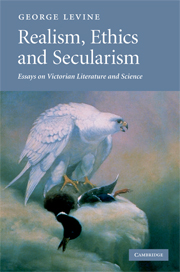Chapter 1 - George Eliot's hypothesis of reality
Published online by Cambridge University Press: 22 September 2009
Summary
The image of George Eliot, bending forward, listening during one of her regular Sundays with selfless and disciplined attention to her admiring visitors, corresponds precisely to the moral and intellectual ideal that informs her novels. Such an ideal, from a very modern perspective, at least, entails the denial of the libidinal energies essential to psychic health, and we point knowingly now to George Eliot's headaches and fragile health. But the denial we may abhor was, for George Eliot, an ethical and epistemological imperative. Ironically, especially from the perspective of much contemporary feminist criticism, she believed that submission of the self to the voices of external reality was a condition of real knowledge (just as, for contemporary Victorian science, objectivity was a condition of acquiring the truth). The failures of Lydgate and Casaubon result primarily from the failure to submit, that is, to restrain their egoistic needs from influencing their intellectual work. It is not only that reality remains incommensurate with the desires of an aspiring self (a convention of narrative since at least Don Quixote), but that personality is an obstruction to perception. The common self is merely personality.
In addition, there has been a large literature in recent years that has taken that ideal with more than a grain of salt, finding in George Eliot's overt sympathy a barely disguised hostility, translating sympathy into a kind of hypocrisy that attempts to make an aggressive self-assertion look good.
- Type
- Chapter
- Information
- Realism, Ethics and SecularismEssays on Victorian Literature and Science, pp. 25 - 50Publisher: Cambridge University PressPrint publication year: 2008



